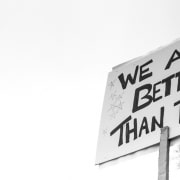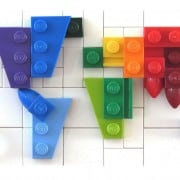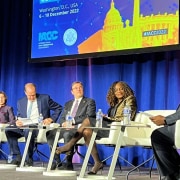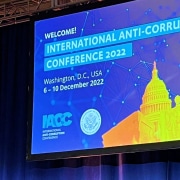|
Getting your Trinity Audio player ready...
|
Image of the International Criminal Court from Wikipedia, used under a Creative Commons Attribution-Share Alike 3.0 Unported license.
One current hot topic in the news and elsewhere is that of the establishment of an international anti-corruption court (IACC). There are arguments for, and against, the proposal – and both sides make valid points. Part 1 of our new mini-series takes a closer look at the concept of an IACC and the inevitable comparisons with the International Criminal Court (ICC), while part 2 presents some of the factors, already raised by experts, analysts, and researchers, that may influence the establishment of an IACC.
Has the time come to set up an international anti-corruption court? With increasing evidence that grand corruption is on the rise around the world, and clear indications that many countries are not keeping up with its growth, nor do they have the capacity and resources to investigate and prosecute, the idea of an international institution that could relieve some of the pressure is enticing.
Like the ICC, the new body would be an intergovernmental organisation, and would have extraterritorial jurisdiction over corrupt activities committed by current and former political persons.
Also like the ICC, there are questions already being raised about the overall effectiveness of an IACC, the scope of its jurisdiction, the cost of running such an operation, and whether it is actually needed right now.
What is not in dispute, says anti-corruption resource centre U4, is that in many countries, corrupt elites have de facto impunity from prosecution because the justice systems in those countries are unwilling or unable to hold powerful senior figures and their associates criminally accountable. “Wealth and power acquired through corruption can be used to buy impunity, and that impunity allows the further corrupt accumulation of wealth and power.”
This is the crux of the argument for an IACC. By taking up the case where the individual’s government has declined to or cannot prosecute, the IACC would be able to exact justice in the long run.
Under this argument, there are three benefits to having an IACC:
- It might help address grand corruption by boosting the deterrence factor;
- It would motivate countries to improve their domestic justice systems to demonstrate that they can manage without the IACC; and
- It would send a strong message of support to anti-corruption practitioners, but also one of caution to the corrupt.
The question then arises as to whether corrupt leaders, who can get away with much in their own countries, would voluntarily submit those countries to the IACC’s jurisdiction or co-operate with requests, and if not, whether efforts to force the issue would be counterproductive to the larger cause.
Support from civil society, world leaders
Corruption Watch’s executive director Karam Singh is one of numerous civil society representatives, as well as individuals, organisations, former statesmen, and government representatives, who have affixed their signatures to a document calling for the swift establishment of an IACC.
The declaration is an ongoing initiative of Integrity Initiatives International (III) and Club de Madrid, and the list includes more than 250 prominent individuals from over 75 countries. Among them are 42 former presidents and prime ministers, many of whom are members of Club de Madrid, a forum of democratic former world leaders.
From the African continent, supporters include former Malawian president Joyce Banda, former Nigerian president Olusegun Obasanjo, former Mozambican president Joaquim Chissano, former South African president Thabo Mbeki, and former Liberian president Ellen Johnson Sirleaf. It must be noted that this specific group has not signed the declaration.
Joining them from South Africa are the likes of Iraj Abedian, former member of Mbeki’s economic advisory committee, former Constitutional Court judges Ian Farlam, Dikgang Moseneke and Albie Sachs, Archbishop Thabo Makgoba of the Anglican church, and Navi Pillay, former ICC judge and former UN High Commissioner for Human Rights.
In addition, a total of 32 Nobel laureates have endorsed the IACC initiative.
South African legal eagles Paul Hoffman and Richard Goldstone both sit on the III board.
Will an IACC be effective?
An IACC might help address grand corruption by strengthening deterrence, by motivating countries to improve their domestic justice systems (so as to avoid falling under the IACC’s jurisdiction), and by communicating international disapproval of grand corruption. However, a look at the overall effectiveness of the ICC brings up some potential stumbling blocks.
In terms of numbers, the ICC, in 17 years, has achieved 10 convictions, with four acquittals. Some cases have been closed due to the deaths of defendants, while others are ongoing.
In a 2011 paper on the effectiveness of the ICC, Prof Retselisitsoe Phooko of the University of Johannesburg law school mentions arrest warrants that have been pending for too long, victims’ lack of understanding of the workings of the court, and poor co-operation with the court from countries. “The fact that it has secured no convictions in eight years of existence can easily lead to an unjust conclusion that the ICC has failed,” he wrote at the time, while noting that the ICC was still in its early days. “Its success should not be measured by the delay in securing a first conviction, but the legitimacy of how it conducts its investigations and proceedings.”
A more recent study, published in 2020 by political scientist Sarah J. Goodman, notes that: “Of the thousands of situations and potential cases that could have been investigated by the ICC and come to trial, only 44 people have been indicted, with 45 cases before the ICC. Further, only 14 out of the 45 have resulted in a complete proceeding.”
However, Goodman notes a connection between state bias (anti- or pro-ICC) and the ability of the ICC to prosecute. All of the 44 people indicted have come from Africa, which presents a problem in terms of potential bias and the possibility of securing a conviction. In fact, in 2016 the African Union and several individual countries including South Africa threatened to withdraw from the ICC, citing unfair targeting of the continent.
“I found in my research that pro-ICC biases and full state co-operation lead the ICC to be more effective in obtaining the Confirmation of Charges Hearing,” Goodman writes. At a confirmation of charges hearing, ICC judges determine whether or not the evidence is compelling enough to establish substantial grounds on which a case against the suspect can be built. If the charges are fully or partly confirmed, the case moves forward to the trial phase.
These factors, and others that affect the workings of the ICC, are likely to apply to the IACC as well.
There are other obstacles to the IACC project. Leaders who enjoy de facto impunity for grand corruption in their own courts, says U4, “may be unwilling to submit their countries to the jurisdiction of an IACC, and methods to compel countries to join such a court may be ineffective or counterproductive. An IACC might not be able to effectively prosecute grand corruption due to the prosecutors’ limited toolkit and the likely non-cooperation of the countries whose leaders are under investigation.”
There are also questions about cost-effectiveness. Operation of the court might cost hundreds of millions of dollars per year, money that could be used to strengthen other, existing efforts to reduce grand corruption and impunity.
“If we were to get an IACC established there are no guarantees that it would be more effective than the ICC,” says CW’s Singh. “The ICC has had some achievements but also many challenges including losing political support. For the IACC to be effective, it would have to establish and maintain the political support required.”
Echoing one of the questions already raised in this article, Singh points out the challenges associated with sustaining the necessary support in a world where there is so much corruption linked to state officials.
“When such a court begins to pursue certain cases, it will immediately come under attack as being selective, so it will take time for a court like this to withstand the type of scrutiny that it will come under.”
In part 2 of our mini-series we highlight further arguments from experts for and against the establishment of an IACC.








